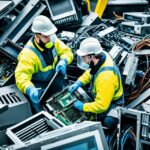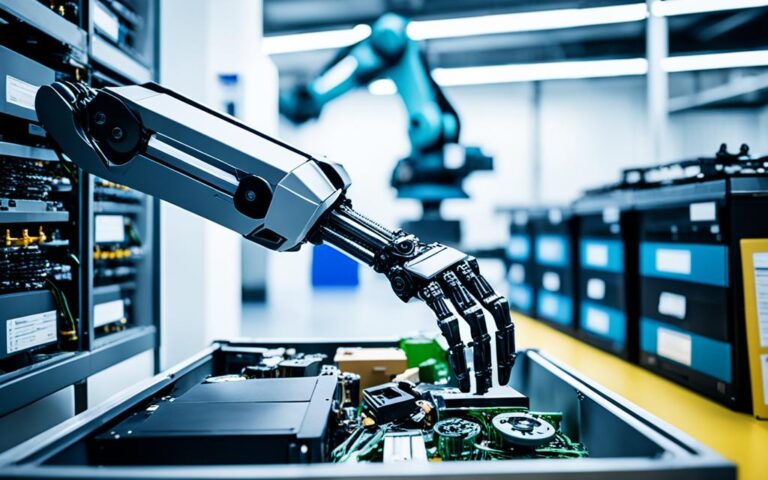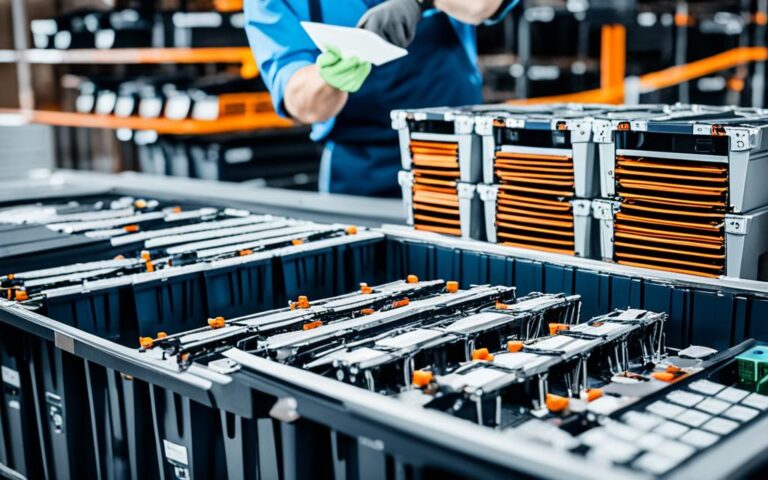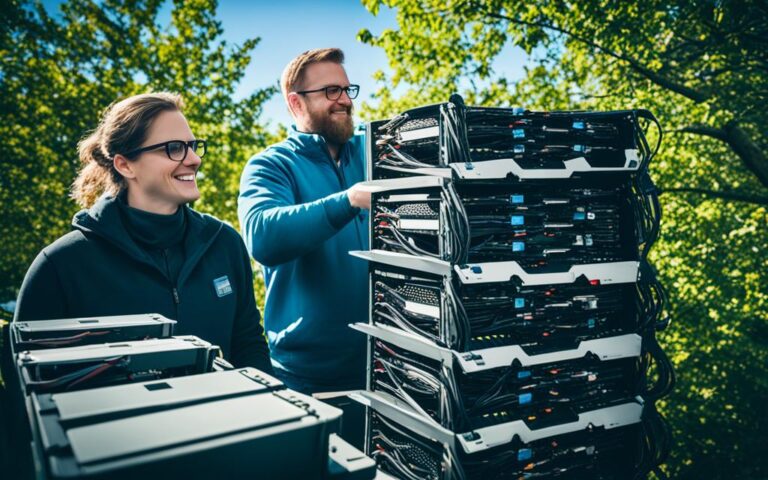The Importance of Server Recycling in the Age of Big Data
As the digital age advances and the volume of data grows exponentially, the importance of server recycling becomes increasingly crucial. Properly managing and recycling servers is not only essential for environmental sustainability but also for responsible data disposal.
The rapid growth in technology has led to a significant increase in the number of computers reaching their end of life each year, resulting in a mounting problem of electronic waste. The environmental cost of e-waste, especially from computers, is alarming and poses risks to ecosystems.
Computer recyclers play a pivotal role in tackling this e-waste crisis by ensuring that devices are recycled in a manner that reduces environmental harm, extracts value, and protects data. Server recycling is not just about sustainability; it’s about responsibility to our planet and its inhabitants. By embracing server recycling, we can contribute to a greener digital future.
The Evolution of Computers and the Rise of E-Waste
Over the decades, computers have transitioned from being a luxury item to an indispensable tool in our daily lives. With advancements in technology, computers have gone from huge mainframes to portable laptops and compact tablets. This exponential increase in computer production and consumption has resulted in a surge in the number of devices becoming obsolete each year. The constant need to upgrade and replace computers poses a significant challenge: what should we do with the countless old machines? Simply discarding them is not environmentally or ethically viable. The rapid growth in computer usage has contributed to the mounting problem of e-waste, with computers representing a significant proportion of this waste. The need for computer recycling has become imperative to responsibly manage and dispose of these devices.
The evolution of computers has revolutionized the way we work, communicate, and access information. From the early days of room-sized mainframes to the sleek and powerful devices we use today, technology advancements have driven the widespread adoption of computers in various sectors and industries. However, with progress comes the challenge of managing the discarded devices that have served their purpose.
“The constant need to upgrade and replace computers poses a significant challenge: what should we do with the countless old machines?”
Computer production has skyrocketed as more people rely on computers for both personal and professional use. This growth in computer consumption has led to an alarming increase in electronic waste or e-waste. E-waste encompasses a wide range of discarded electronic devices, with computers being a major contributor to the problem. The rapid pace of technological advancements has shortened the lifespan of computers, rendering many devices obsolete within a few years.
The Impact of Technological Advancements
The rapid evolution of computer technology has fueled the demand for newer and more advanced devices. As a result, older computers are quickly replaced, leading to a surge in e-waste. This cycle of production and obsolescence has created an urgent need to address the environmental impact of discarded computers.
According to e-waste statistics, millions of tons of electronic waste are generated globally each year, with a significant proportion originating from computers. The improper disposal of e-waste can have severe consequences for the environment. Many computer components contain hazardous materials such as lead, mercury, and cadmium, which can contaminate soil, water, and air if not handled properly.
“Simply discarding old computers is not environmentally or ethically viable.”
Responsible computer recycling is crucial to prevent the harmful effects of e-waste. By recycling computers, valuable materials can be recovered and reused, reducing the need for raw materials. Additionally, proper computer recycling ensures that hazardous substances are safely disposed of, minimizing the environmental impact.
The Urgent Need for Computer Recycling
The rise of e-waste poses significant challenges for governments, organizations, and individuals. It calls for a shift in mindset towards responsible disposal and recycling of computers. By embracing computer recycling, we can contribute to a more sustainable future.
Computer recycling involves the collection, sorting, and dismantling of old computers. Skilled technicians carefully separate and extract valuable components like hard drives, RAM, processors, and motherboards. These components undergo treatment to extract materials like gold, silver, and copper, which can be reused in the production of new devices. Plastics from computers are also processed separately for reuse.
Table:
| Problem | Solution |
|---|---|
| Mounting e-waste from computer disposal | Responsible computer recycling |
| Environmental impact of hazardous substances in computer components | Safe disposal and extraction of materials |
| Reduction of raw material consumption | Reuse of valuable materials |
Computer recycling plays a vital role in reducing e-waste and minimizing the ecological footprint of computer consumption. By recycling our old computers, we can contribute to the conservation of resources, protect the environment, and create a sustainable future.
The Environmental Impact of E-Waste
The digital age has brought about unparalleled technological advancements but has also given rise to a concerning environmental issue – the surge in electronic waste. Among this waste, computers make up a significant portion.
Annually, millions of tons of electronic waste are produced globally, and a significant percentage of this is from old and obsolete computers. The impact of this e-waste problem is widespread and alarming, affecting ecosystems and posing health risks to humans.
Recognizing the environmental repercussions of uninformed disposal, the emphasis on the need to recycle computer units has become a global call to action. Recycling computers is not only about sustainability but also about mitigating the environmental challenges imposed by the disposal of computer components containing hazardous substances.
The Alarming Statistics of E-Waste
Let’s take a closer look at some eye-opening e-waste statistics:
1. Approximately 50 million metric tonnes of electronic waste are generated globally each year, with computers accounting for a significant portion of this waste.
2. Out of the total e-waste generated, only 20% is recycled through formal channels.
3. When electronic waste isn’t recycled properly, it can release hazardous substances like lead, mercury, and cadmium into the environment, posing long-term risks to soil, water, and human health.
4. Recycling one million laptops saves the energy equivalent to powering over 3,500 homes for a year.
These statistics highlight the urgent need for responsible e-waste management and proper recycling of computers.
The Environmental Cost of Discarded Computer Components
Computer components contain materials like metals, plastics, and chemicals that have significant environmental impacts if disposed of improperly. Let’s explore the environmental costs associated with these components:
- Metals: Computers contain valuable metals such as gold, silver, copper, and palladium. Mining these metals creates extensive environmental damage, including deforestation, soil erosion, and water pollution. By recycling computers, we can reduce the demand for new raw materials and curtail these destructive mining practices.
- Plastics: The majority of computer casings are made from plastics derived from fossil fuels. Improper disposal of these plastics contributes to the growing problem of plastic pollution in landfills, oceans, and ecosystems. Recycling computers allows for the recovery and reuse of these plastics, reducing our reliance on virgin materials and minimizing plastic waste.
- Chemicals: Computer components also contain hazardous substances like lead, mercury, and flame retardants that can contaminate the environment when improperly disposed of. These toxins can leach into the soil and water, posing risks to both wildlife and human health. Proper recycling ensures that these chemicals are contained, preventing environmental contamination.
By recycling computers and their components, we can minimize the environmental cost of e-waste, promoting a cleaner and more sustainable future.
How Computer Recyclers Tackle E-Waste
Computer recyclers are the unsung heroes in addressing the e-waste crisis. Their efforts go beyond waste management; they serve as stewards of the environment. Computer recyclers have the expertise to safely dismantle computers, ensuring harmful components are not released into ecosystems. They play an indispensable role in mitigating the looming e-waste catastrophe by promoting and executing effective methods of recycling computers.
Data security is a primary concern, and computer recyclers prioritize it through rigorous data destruction procedures before any recycling or refurbishing is carried out. Their commitment to data safety highlights the importance of choosing certified and reputable recyclers who not only protect the environment but also prioritize data security.
“Computer recyclers are at the forefront of the battle against e-waste. Their dedication to responsible disposal and data security sets an example for the industry. By choosing certified recyclers, businesses and individuals can contribute to a greener, safer future.”
Computer recyclers are committed to waste management and responsible disposal. They adhere to strict guidelines and regulations to ensure the proper treatment of e-waste. By partnering with computer recyclers, businesses and individuals can ensure that their old devices are recycled in a manner that minimizes environmental impact and maximizes resource recovery. This not only reduces the burden on landfills but also supports the circular economy.
As technology continues to advance, the role of computer recyclers becomes even more critical. Their expertise in handling and recycling electronic devices ensures that valuable materials can be recovered and reused, reducing the need for new raw materials and minimizing the environmental footprint of the tech industry.
The Benefits of Choosing Certified Computer Recyclers
When selecting a computer recycler, it is essential to choose a certified and reputable service provider. Certified recyclers adhere to strict data security protocols and environmentally responsible practices. By choosing certified recyclers, businesses and individuals can enjoy the following benefits:
- Secure data destruction: Certified recyclers prioritize data security and employ robust data destruction methods to safeguard sensitive information.
- Environmental compliance: Certified recyclers follow industry regulations and guidelines to ensure responsible disposal and reduce environmental impact.
- Proper component recycling: Certified recyclers have the expertise to handle different types of computer components, ensuring they are recycled or disposed of properly.
- Guaranteed compliance with legal requirements: Certified recyclers are well-versed in legal requirements and can provide the necessary documentation to demonstrate regulatory compliance.
- Peace of mind: Choosing certified recyclers gives businesses and individuals confidence that their devices will be recycled responsibly and in accordance with industry standards.
Data Security and Responsible Recycling
Data security is a crucial aspect of computer recycling. Before any recycling or refurbishing takes place, computer recyclers ensure that all data is effectively destroyed. This involves thorough data wiping or physical destruction of storage devices to prevent unauthorized access to sensitive information.
Computer recyclers employ various data destruction methods, including software-based erasure and physical shredding. By partnering with certified recyclers, businesses can rest assured that their data is protected throughout the recycling process.
A Comprehensive Approach to E-Waste Management
Computer recyclers adopt a comprehensive approach to e-waste management. They not only focus on recycling computers but also strive to educate businesses and individuals about the importance of responsible disposal.
By raising awareness and providing convenient recycling options, computer recyclers empower individuals and organizations to make sustainable choices. This collaborative effort helps reduce the environmental impact of e-waste and ensures a brighter future for generations to come.
| Benefits of Choosing Certified Computer Recyclers | Choose Certified Computer Recyclers for: |
|---|---|
| Secure data destruction | Data security and peace of mind |
| Environmental compliance | Guaranteed compliance with legal requirements |
| Proper component recycling | Sustainable and responsible recycling |
Partnering with certified computer recyclers is the key to tackling e-waste effectively. By entrusting your old devices to reputable recyclers, you can contribute to waste reduction, support the circular economy, and protect both the environment and your data.
The Journey of Computer Recycling
The process of recycling computer units is a meticulous and comprehensive one. It begins with the collection of devices from businesses, institutions, or individuals through specialized bins or drop-off points.
Once at the recycling facility, computers undergo a thorough sorting process based on their type and condition. This step determines whether they can be refurbished or proceed to component recycling.
Skilled technicians then manually dismantle the computers, carefully separating components such as hard drives, RAM, processors, and motherboards. This meticulous dismantling ensures that valuable materials can be extracted and reused.
Components such as metals, including gold, silver, and copper, undergo extraction using both chemical and mechanical processes. Plastics are processed separately to be reused in other manufacturing processes.
“The recycling process plays a crucial role in reducing the need for new raw materials and promoting sustainable practices,” says Sarah Johnson, a computer recycling expert.
Special attention is given to components that contain hazardous substances. By handling and disposing of these materials properly, computer recyclers prevent environmental contamination and safeguard ecosystems.
The materials recovered from the recycling process are repurposed and resold, reducing the demand for new resources. This promotes a circular economy and contributes to the overall sustainability of the computer industry.
By participating in the journey of computer recycling, we can all play a part in reducing electronic waste, conserving valuable resources, and working towards a greener future.
The Benefits of Computer Recycling:
- Reduces electronic waste and prevents it from ending up in landfills
- Conserves valuable resources by extracting and reusing components
- Prevents environmental contamination from hazardous materials
- Promotes a circular economy and sustainable practices
- Enhances resource efficiency and reduces the demand for new materials
By understanding and supporting the journey of computer recycling, we can all contribute to a more sustainable and environmentally responsible future.
Bridging the Gap: Making Recycling Accessible
With the increasing reliance on digital technology, it is crucial to prioritize responsible disposal and recycling of electronic devices. To bridge the gap between users and computer recyclers, modern-day initiatives aim to simplify the complex world of e-waste management.
Geolocation-based platforms quickly point users to the nearest recycling facilities or drop-off points, making e-waste disposal as convenient as purchasing new devices. Through these user-friendly platforms, individuals can easily locate and participate in recycling initiatives.
Information portals provide users with essential insights into the recycling process and the environmental impact of their choices. By educating users about the importance of responsible disposal and recycling, these platforms encourage eco-conscious decision-making.
Trustworthiness metrics play a crucial role in helping users choose certified and reputable recyclers. By providing detailed evaluations and reviews, these metrics ensure that user-friendly platforms connect individuals with reliable and responsible recycling services.
Scheduling services are another valuable feature of these initiatives. By offering convenient pickup scheduling options, these platforms eliminate the barriers of busy schedules and streamline the connection between users and recyclers.
“Modern recycling initiatives strive to make the responsible disposal of electronic devices as effortless as possible, empowering individuals to contribute to a more sustainable future.”
These innovative platforms and apps are revolutionizing the way we approach recycling, making it more accessible, user-friendly, and environmentally sustainable. By embracing these eco-friendly solutions, we can collectively work towards a greener future.
| Initiative | Key Features |
|---|---|
| Geolocation-Based Platforms | Simplifies e-waste disposal by directing users to nearby recycling facilities or drop-off points. |
| Information Portals | Provides insights into the recycling process and raises awareness about the environmental impact of electronic waste. |
| Trustworthiness Metrics | Assists users in choosing certified and reputable recyclers, ensuring responsible disposal. |
| Scheduling Services | Enables users to conveniently schedule pickups, removing barriers posed by busy schedules. |
Conclusion
In the age of big data, server recycling plays a pivotal role in achieving environmental sustainability and responsible disposal. With the volume of electronic waste steadily increasing, it is imperative that we prioritize the proper disposal and recycling of computers for a greener future.
Computer recyclers are the unsung heroes in the fight against the environmental impact of e-waste. By safely dismantling computers, they extract valuable components while minimizing the release of harmful substances into ecosystems. In addition to protecting the environment, computer recyclers prioritize data security, ensuring that sensitive information is destroyed using rigorous procedures.
Server recycling is about more than just sustainability; it is about taking responsibility for our planet and its inhabitants. By embracing the recycling initiatives and supporting eco-friendly solutions, we can work towards a greener digital future for the United Kingdom and beyond.
Join the movement towards a sustainable tomorrow by learning more about server recycling in the UK at https://it-recycle.uk/server-recycling-uk/.
FAQ
What is server recycling?
Server recycling is the process of responsibly disposing of and recycling servers, which are computer devices used for data storage and processing. It involves dismantling the servers, extracting valuable components, and recycling or repurposing the materials to minimize environmental impact.
Why is server recycling important?
Server recycling is crucial for environmental sustainability. As the volume of electronic waste, including servers, continues to grow, it is essential to properly manage and dispose of these devices to reduce the impact on ecosystems. Additionally, server recycling ensures responsible data disposal and protects sensitive information.
How does server recycling contribute to a greener future?
By recycling servers, valuable components can be recovered and reused, reducing the need for new raw materials. This promotes sustainable practices and helps conserve natural resources. Server recycling also minimizes the release of harmful substances into the environment, creating a greener future for the UK and beyond.
What happens to servers during the recycling process?
During the server recycling process, servers are dismantled by skilled technicians. Valuable components like hard drives, processors, and motherboards are extracted and either refurbished for reuse or recycled to recover valuable metals such as gold, silver, and copper. Hazardous substances are handled with special care to prevent environmental contamination.
How can I recycle my old servers?
To recycle your old servers, you can contact certified computer recyclers who specialize in server recycling. They will provide collection services or direct you to designated drop-off points. It is important to choose reputable recyclers who prioritize data security and follow environmentally responsible practices.
What steps should I take to ensure data security when recycling servers?
To ensure data security when recycling servers, it is essential to choose certified and reputable recyclers. These recyclers follow stringent data destruction procedures to eliminate the risk of data breaches. Make sure to inquire about their data destruction methods and certifications before handing over your servers for recycling.














